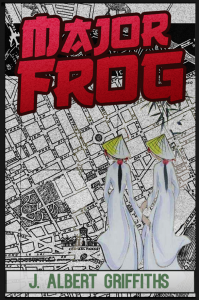 Major Frog, by J. Albert Griffiths, whisks readers back in time to the Vietnam War.
Major Frog, by J. Albert Griffiths, whisks readers back in time to the Vietnam War.
Charlie Albright had a short stint in the air force when he was younger. He’s older now, but is he wiser? He signs on to an Army contract and ends up in Vietnam during the war.
Two North Vietnamese sisters are secretly employed by the enemy. Both enter Charlie’s life and entangle the American into their nefarious schemes.
Charlie, a good guy who understands the shades of gray, knows the Army CID and local police are watching. That doesn’t stop him from entering dangerous territory willingly.
During the best of times there are many opportunities to profit financially especially if one resorts to illegal means. Wartime seems to increase the odds drastically, and adding political ideology ups the ante when it comes to danger, dedication, and desperation. This novel delves into the war’s seedy underworld not in the combat zones, but in Saigon. The corruption that’s unearthed isn’t what’s typically discussed in history classrooms when analyzing the Vietnam War. Money laundering is usually reserved for mob stories. But the author makes a convincing case that this issue was not only prevalent, but perilous for the individual and the US army.
Griffiths brings wartime Saigon to life making the reader wonder if he was there during the war. He’s comfortable describing military personnel, policies, and practices and does so with ease making it easy for the readers to insert themselves into a different time and culture. The tension in this story builds slowly. There’s the nagging feeling that something bad is going to happen, but it takes time for it to finally come to fruition. Once it does, the action is a bit rushed, leaving the reader wanting more bang from the story.
Charlie is at the center of everything and he’s a difficult character to pin down. In the opening pages, when he’s contemplating signing the Army contract he seems too naïve. He runs into two Australian soldiers on leave from the war in a bar in Hawaii and is surprised by their negative attitudes about the war raging in Vietnam. It’s December in 1968, which was a key year for protest against the war. It’s hard to understand Charlie’s innocence regarding a war that was dividing a nation, which was also featured nightly on television newscasts. Later in the novel he’s portrayed as brave, cunning, and demanding respect. This duality to his persona is never fully explained.
However, Charlie’s innocence allows the author to show the war through the eyes of a man who is mostly clueless to the dangers allowing him to foolishly plunge into schemes that put his life at risk. Placing a loving and uncomplicated man in the midst of a war makes for entertaining reading, adding to the tension. Ultimately, Charlie is a good guy trying to make the right decisions. Even when he finds out people are trying to kill him he can’t stop himself from going forward with his attempt to make things right.
The writing is pretty straightforward, albeit the author loves the semi-colon. This can be a bit jarring and there are times when uses two in one sentence. Aside from this quirk, the story is entertaining and it’s easy to see Charlie having more adventures in the near future.
Links
Amazon
Goodreads
Review Overview
Content
Editing
Design
Get an Editorial Review | Get Amazon Sales & Reviews | Get Edited | Get Beta Readers | Enter the SPR Book Awards | Other Marketing Services























Leave A Comment